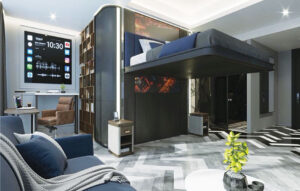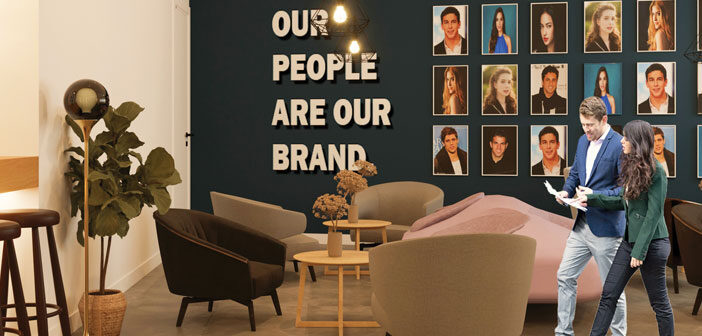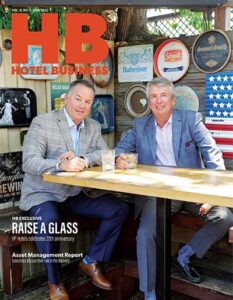When the founders of Mogul Hospitality first launched their company, they had no intention of launching their own hotel brand.
“Our team’s background [includes launching]a few brands in our careers in both big companies and small,” said Alexander Mirza, founder/CEO, Mogul Hospitality, who was part of the team that launched the Waldorf Astoria brand at Hilton. “We have a really high standard for that. We felt that the world doesn’t really need another hotel brand. There are a lot of hotel brands out there—if anything, maybe too many.”
But, when the company started building MogulRecruiter, an AI-driven talent marketplace for hospitality, which was profiled on hotelbusiness.com upon its launch in October 2021, the team saw where it could do it better—for both guests and employees.

The Mogul Hotel and Residences room will have a work/live design, making them convenient for both work and leisure time.
“It was when we started executing and implementing our talent platform and engine,” he said. “You see where it works, where it doesn’t, where the gaps are, why people are leaving this industry or losing confidence in it.”
Mirza said that employees are leaving because they see the disparity between the owners and themselves. “They look up and they see these hotel CEOs and real estate private equity guys—mostly guys—making absurd amounts of money,” he said. “Their employees are doing all the work and they can’t look above them and see a path. That’s the driver of all our challenges in our industry in our opinion. And it’s in our power to change it, and when we saw that we said, ‘Hey, technology can only get you so far.’ Even great technology; even signing bonuses; wage increases. That still is only going to get you so far.”
He continued, “It takes 15 years to be a luxury hotel GM and nobody gets paid based on the actual performance of the real estate or the assets or a proportion of how much wealth they really created. We saw it firsthand. We spoke to 1000s of hotel GMs as well…many who are leaving, many who are still here. We’re working with them all the time. And it’s a compelling problem. We don’t see the existing management companies or brands solving it. I think it needs to be addressed by new brands.”
In order to solve this problem, the company has launched Mogul Hotels and Residences with a new business model for hospitality that Mirza said has seen great success in other industries—employee ownership.
“We believe that that’s really a major way to solve the labor crisis,” he said. “People need to see that a hotel general manager who has created millions and millions of dollars of real estate value gets rewarded for it. The best people can do really well financially, just as they do in other industries. That model of going right down to the front line, having profit sharing and shares in the hotel that vest and get paid out is the future.”
“Once people see that you can make millions a year being a GM of an asset, then you’re going to attract great talent into it,” he added. “They’re going to see, ‘Hey, it’s not just some theoretical career path, but I can make a lot of money doing this.’ And, that’s going to require the owners to work with us to carve that out and treat the employees like they treat their own limited partners, or their own partners in their real estate entity.”
Compensation isn’t the only aspect of the brand when it comes to employee involvement. They will also have more of a say in the operations and decision-making. “They should have board representation at the hotel,” said Mirza. “They should be the ones writing the brand standards, setting customer service guidelines, policies, etc. I think that’s the heart of what’s missing in our business. It’s like going back to the roots of the business but with a new economic model.”
While employee ownership and engagement is one of the pillars of the new brand, with the increase in bleisure travel, another is a work/live design. “There’s just too many hotels with small rooms,” he said. “It just got smaller and smaller and more cookie-cutter. We believe that it’s better—especially if we are going to increase rates—that we go in the other direction.”
Mirza said that every room in the brand’s properties, which will initially be in Los Angeles, San Diego and Miami, will have that design.
“That means we may have to break walls down,” he said. “We may have fewer rooms in our hotels, but I think that is a key part of it. [Our properties] are going to be part residential, as a result, so its going to have a combination of longer- and shorter-term stays.”
The third pillar of the brand will be a focus on sustainability. The company is partnering with Freight Farms, which manufactures hydroponic growing systems in a box. Hydroponic farms, which use up to 99% less water than traditional farming, offers the ability to grow certain products—from seeding to harvesting and packaging—right inside the climate-controlled container.
“That’s going to be where we’re going to really push the envelope and educate the consumer base, take some risk that they’re going to appreciate and enjoy it,” said Mirza. “That’s going to be part of each hotel. Initially, it will be the outdoor container, but then we’re going to look at incorporating it inside the hotel as well. We’re going to do the other good things on sustainability and try to go beyond carbon neutral.”


